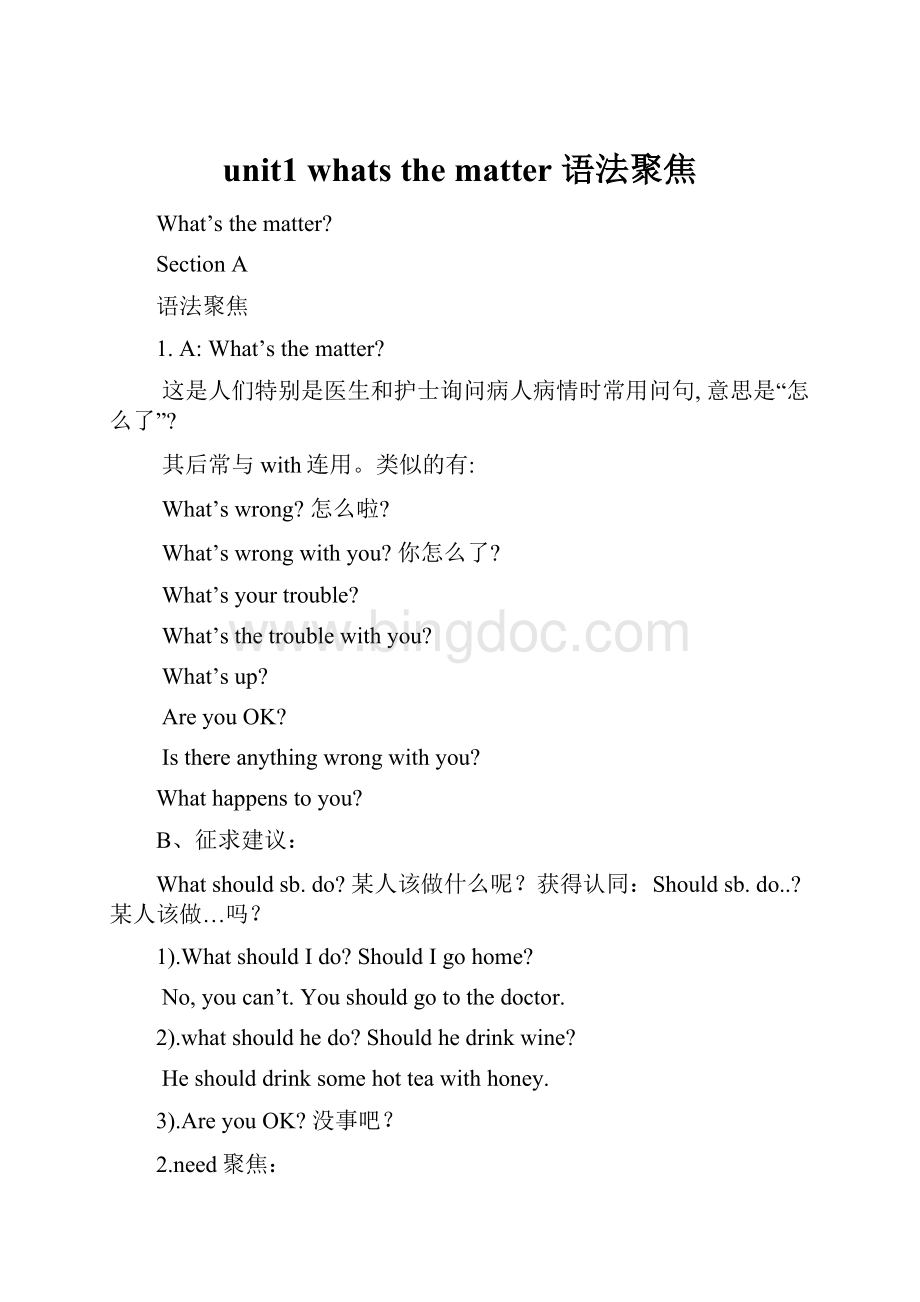unit1 whats the matter 语法聚焦.docx
《unit1 whats the matter 语法聚焦.docx》由会员分享,可在线阅读,更多相关《unit1 whats the matter 语法聚焦.docx(18页珍藏版)》请在冰点文库上搜索。

unit1whatsthematter语法聚焦
What’sthematter?
SectionA
语法聚焦
1.A:
What’sthematter?
这是人们特别是医生和护士询问病人病情时常用问句,意思是“怎么了”?
其后常与with连用。
类似的有:
What’swrong?
怎么啦?
What’swrongwithyou?
你怎么了?
What’syourtrouble?
What’sthetroublewithyou?
What’sup?
AreyouOK?
Isthereanythingwrongwithyou?
Whathappenstoyou?
B、征求建议:
Whatshouldsb.do?
某人该做什么呢?
获得认同:
Shouldsb.do..?
某人该做…吗?
1).WhatshouldIdo?
ShouldIgohome?
No,youcan’t.Youshouldgotothedoctor.
2).whatshouldhedo?
Shouldhedrinkwine?
Heshoulddrinksomehotteawithhoney.
3).AreyouOK?
没事吧?
2.need聚焦:
1).needsth.需要…
Heneedssomewaternow.
2).needtodosth.需要做….
Ineedtohavearest.
3).needn’tdosth.不必做…..
Youneedn'twastetimehere.
4).sth.needdoing东西需要….
YourEnglishneedreading.
3.haveacold伤风,感冒,是固定词组
表示身体不适的常用词组还有:
haveabadcold重感冒
havea(high)fever发烧
haveaheadache头痛
haveastomachache肚子痛,胃痛
haveatoothache牙痛
haveabackache背疼
haveasorethroat喉咙疼
haveafever发烧
haveacold感冒
liedownandrest躺下休息
drinkhotteawithhoney喝热蜂蜜茶
drinklotsofwater喝大量水
seeadentist看牙医
takeone’stemperature量体温
gotoadoctor看医生
getanX-ray做X光检查
putsomemedicineonit在上面敷药
takebreaksawayfrom离开…休息
实践与巩固:
一.根据上下文意思填空。
Mandy:
Lisa,areyouOK?
Lisa:
I____aheadacheandIcan’tmovemyneck.What______Ido?
ShouldI
____mytemperature?
Mandy:
No,itdoesn’tsoundlikeyouhaveafever.What___youdoonthe
weekend?
Lisa:
Iplayedcomputer_____allweekend.
Mandy:
That’sprobablywhy.Youneedtotakebreaks____fromthecomputer.
Lisa:
Yeah,IthinkIsatinthe____wayfortoolongwithoutmoving.
Mandy:
Ithinkyoushould___downandrest.Ifyourheadandneckstillhurt
tomorrow,thengotoa______.
Lisa:
OK.Thanks,Mandy.
二.翻译下列句子。
1.你怎么了?
我头痛。
2.他怎么了?
他发烧。
3.李娜怎么了?
他喉咙痛。
他应该多喝水。
4.如果你的头和脖子明天仍然疼的话,请去看医生。
5、我的脖子不能动弹了.
6、我的头感觉很热.
7、听起来你不像发烧.
8、我用同样的方式坐得太久没动.
SectionA2
短语荟萃:
goalong(walkalong)沿着…走
when当….时
lie-lay-lainlying躺3种词性
onthesideoftheroad在马路边
shoutforhelp呼救
withoutthinkingtwice没多想
geton/off上/下车
Sthhappentosb./sb.happentodosth某事发生在…/碰巧做
haveaheartproblem有心脏病
expectthat/expect(sb.)todo期待/期望某人做…
toone’ssurprise使...惊讶的是(sth)surprising/(sb.)surprised两种词性用法
agreetodo/agreethatagreewithsb/agreeon同意
movesbontosp./getsb.ontosp.抬…到…
thanksto/thanksfor多亏/谢谢
intime/ontime及时/准时
don’twantanytrouble不想惹麻烦
thinkaboutsb./sth./doingsth.(thinkof)考虑
savealife/loseoneslife救命/失去生命
rightaway/atonce/rightnow立刻
getintotrouble/wantsometrouble(beintrouble)惹麻烦
语法聚焦:
1.seesb.doingsth.看见某人正在做某事
e.g.WhenIpassthewindowIseehimdrawingapicture.
Whenthedriversawanoldmanlyingonthesideoftheroad.
......这时司机看到一位老人正躺在路边
seesb.dosth.看见某人做过某事
e.g.Ioftenseehimdrawapicture.
1)我看见他时他正在河边玩。
Isawhim_______bytheriver.
2)我看见过他在河边玩。
Isawhim_____bytheriver.
3)我看着他过了桥。
Iseehim______acrossthebridge.
4)我看见她正在洗碗。
Iseeher_________thedishes.
2.介词+名词/宾格代词/doingsth.
1).Thebusdriver,24-year-oldWangPing,stoppedthebuswithoutthinkingtwice.
2).Heonlythoughtaboutsavingalife.
你能看出“withoutthinking”、“aboutsavingalife”的共同点吗?
1)Iamfine.Whatabout____(she)?
2)Thanksfor______(tell)methestory?
3)Itisasunnyday.Howabout_____(go)fishing?
4)Itisgoodtorelaxby______(use)theInternetor_________(watch)gameshows
3.Buttohissurprise,theyallagreedtogowithhim.
toone’ssurprise使......惊讶的是,出乎......意料
e.g.Totheirsurprise,allthestudentspasstheexam.
asurprisingstorybesurprisedat…
4.becausetheydon’twantanytrouble,trouble“困难;麻烦”,不可数名词。
如:
I’msorrytogiveyousomuchtrouble.
1)beintrouble“有困难;陷入困境”。
如:
Healwaysasksmeforhelpwhenheisintrouble.
2)getsb.intotrouble“使某人陷入困境”。
如:
Ifyoucome,youmaygetmeintotrouble.
3)主语+have/hastrouble(in)doingsth.“某人在做某事方面有困难”。
eg:
Ihavesometrouble(in)readingtheletter.
trouble“麻烦事;烦心事”,可数名词。
eg:
Shewasonthephoneforanhourtellingmehertroubles.
5.It+be+adj.+that(主语从句)
It’ssadthatmanypeopledon’twanttohelpothersbecausetheydon’twantanytrouble.
翻译时,我们要把that从句的意思提到前面:
“因为怕惹麻烦,很多人不想帮助别人是令人寒心的。
”
Itisverynecessarythatwestudyhardnow.
实做与巩固
根据汉语意思完成英语句子。
(1)他认为每天吃饭是一件麻烦事。
Hethinksthateatingeverydayis_________.
(2)你知道你现在为什么处于困境吗?
Doyouknowwhyyou_____________now?
(3)我妹妹在学习英语方面有困难。
Mysister_____________________English.
6.neededtogothehospitalrightaway.
rightaway“立刻;马上”=inaminute=rightnow=atonce
eg:
I’llbethererightaway/inaminute.
根据汉语意思完成英语句子。
你必须马上出发。
Youmuststart________________________________________.
短语实践:
1)看到某人正在做某事
2)让某人吃惊的是
3)下车
4)上车
5)多亏,幸亏
6)考虑
7)同意做某事
8)造成麻烦
用括号内的词的适当形式填空。
1.Thedriversawanoldman_____(lie)ontheroad.
2.Isatinthesamewaywithout________(move).
3.Heonlythoughtabout______(save)alifeanddidn’tthinkabout_______(him).
4.Theoldmanneeded_____(go)tothehospital.
5.Awomanwas________(shout)forhelp.
6.Heexpectedthem______(get)offthebus
SectionA
聚集secionA:
1.have
1).作“有”讲。
如:
Ihaveabag.我有一个包。
Hehasaredcup.他有一个红杯子。
2).作“吃、喝”讲。
如:
havebreakfast(吃早饭)
havetea(喝茶)
haveabiscuit(吃块饼干)
haveadrink(喝点水)
3).“患病”haveacold,haveafever
4).固定短语
haveatry,havealook,haveaparty
巩固与运用
1).她有许多好朋友。
She____lotsofgoodfriends.
2).当我们感冒时,应该多喝水。
Whenwe_____badcolds,weshoulddrinkmorewater.
3).他早餐常吃鸡蛋。
He____eggsforbreakfast.
4).他昨天去参加聚会了。
He__________yesterday.
2.should属情态动词,后接动词原形,没有人称和数的变化。
用于提出建议劝告别人。
should的否定形式为shouldnot,通常缩写为shouldn’t。
1).—Tom,Ihaveatoothache.汤姆,我牙痛。
—Youshouldseeadentist.你应当去看牙医。
2).—I’mnotfeelingwellthesedays.Ihavebadcough.
这些天我身体不适,老是咳嗽。
—Youshouldn’tsmokesomuch,Ithink.
我认为你不该抽这么多烟。
3).—ShouldIputsomemedicineonit?
—Yes,youshould./No,youshouldn’t.
4).—Whatshouldshedo?
—Sheshouldtakehertemperature.
实践运用
1.—Shehasastomachache.
—She__________eatsomuchnexttime.
2.—ShouldsheseeadentistandgetanX-ray?
—Yes,she_______./No,she_________.
3.反身代词(oneself)又称为自身代词,表示动作行为反射到行为执行者本身。
它还可以在句中起到强调的作用,用以加强语气。
英语中共有八个反身代词,在使用时应注意和它所指的相应的对象在人称、性别、数上保持一致。
其基本形式如下表所示:
第一人称
第二人称
第三人称
单数
myself
yourself
himself
herself
itself
复数
ourselves
yourselves
themselves
1.可用作宾语,指的是宾语和主语表示同一个或同一些的人或事物。
Mariaboughtherselfascarf.
玛丽亚给自己买了一条围巾。
Wemustlookafterourselvesverywell.
我们必须好好照顾自己。
2.可用作表语,指的是表语和主语表示同一个或同一些人或事物。
Sheisn’tquiteherselftoday.
她今天身体不太舒服。
3.可用作主语或宾语的同位语,常用来加强语气
SheherselfwillflytoLondontomorrow.
明天她自己将要坐飞机去伦敦。
Imetthewriterhimselflastweek.
我上周见到了那位作家本人。
4.用在某些固定短语当中。
照顾自己lookafteroneself/takecareofoneself
自学teachoneselfsth./learnsth.byoneself
玩得高兴,过得愉快enjoyoneself
请自用……(随便吃/喝些……)helponeselftosth.
摔伤自己hurtoneself
自言自语saytooneself
沉浸于,陶醉于……之中loseoneselfin
把某人单独留下leavesb.byoneself
给自己买…...东西buyoneselfsth.
介绍……自己 introduceoneself
休息getsomerest/havearest
Notice:
1.反身代词不能单独做主语,但可以做主语的同位语,起强调作用。
Imyselfcanfinishmyhomework.
Icanfinishmyhomeworkmyself.
2.反身代词表示“某人自己”,表达“某人自己的(东西)”时,须要用one’sown.
I’mdrawingwithmyowncrayons.我用我自己的蜡笔画画。
运用与实践:
1.Myclassmate,LiMing,madeacardfor
_______justnow.
2.Badluck!
Icut_______withaknifeyesterday.
3.Theytellustheycanlookafter__________
verywell.
4.Mycatcanfindfoodby_____.
5.Help__________tosomebeef,boys.
SectionB
1.短语荟萃
gotothehospital上医院
pressthesidesofone’snose压住鼻子的两侧
putone’sheaddown把头低下
restforafewdays休息几天
gethitonthehead头部受到撞击
haveanosebleed流鼻血
makenotesabout做关于…记录
cutoff切除
getoutof…离开
halfone’sarm半条胳膊
giveup放弃
put…inorder按顺序排
haveproblembreathing呼吸困难
findsb.in找到某人在…
gethitbyaball被球击中
becauseof+名词/宾格代词/doing./because+that从句因为
getsunburned.被晒伤
takearisk/takerisks冒险
loseone’sway/loseone’slife/arm/losetoomuchblood迷路/失去生命/胳膊/失去很多血
becaughtunder被压在…下
climbbyoneself独自爬山
fallon/falldown朝…落下/摔倒
toomany/toomuch/muchtoo太多/太
findhelp寻求帮助
befree/freeone’sarm有空/让胳膊挣脱
runoutof用光
saveone’slife拯救某人自己的生命
bereadytodosth/bereadyforsth.准备做/为…做准备
cutoff/cutdown/cutup/cut…into/cutin切除/砍倒/切碎/切成/插入
havethesamespiritassb.跟…有同样的精神
die-dead-dying-death死的3种词性:
v.-adj.-ving.-n.
getoutof从…出来
beincontrolof掌控
keepondoing<中有间隔>/keepdoing/keepsb.doing继续做/不间断地做/让某人一直做
decidetodo/makeadecisiontodosth决定做
climbthemountain/gomountainclimbing/mountainclimbing爬山/去爬山/登上运动
2.tellsbsth/that告诉某人…,tellsb.todo告诉某人做,tellsth.tosb.讲…给…听
3.hitsb.撞到…,hitsb.in(on)打某人…部位。
in用于eye.mouth.face.stomach等软部位,on用于head.nose.back.chest等硬部位。
语法聚焦
一.状语从句
在复合句中,用作状语的从句。
根据意思可分为时间、原因、条件、结果、让步等类型。
1.结果状语从句sothat/so…that…(结果)
1)Hebandagedhimselfsothathewouldnotlosetoomuchblood.
2)Hisloveformountainclimbingissogreatthathekeptonclimbingmountainsevenafterthisexperience.
sothat
引导目的状语从句,译为“为了,以便”,
引导结果状语从句,译为“因此;所以,结果…”。
e.g.Ispeakloudlysothatallthestudentscanhearmeclearly.(目的状语从句)
Marialikesthewoolendresssothatshedecidestobuyitimmediately.
sothat引导目的状语从句时,表“以便;为了”,常使用…sothat…can/could/may/might/will/would/should…
e.g.
Heworkedhardathislessonssothathecouldgainhighgradesintheexams.
他努力学习,以便争取考试能获得好成绩。
Heworkedhardathislessons,sothathegainedhighgradesintheexams.
他努力学习,结果考试获得了好成绩。
so...that...中的so是副词